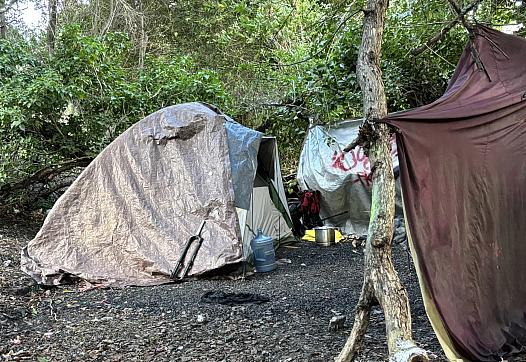Breaking the Cycle: TMHA’s comprehensive approach to homelessness & PTSD
The story was originally published in KCBX with support from our 2023 Data Fellowship.
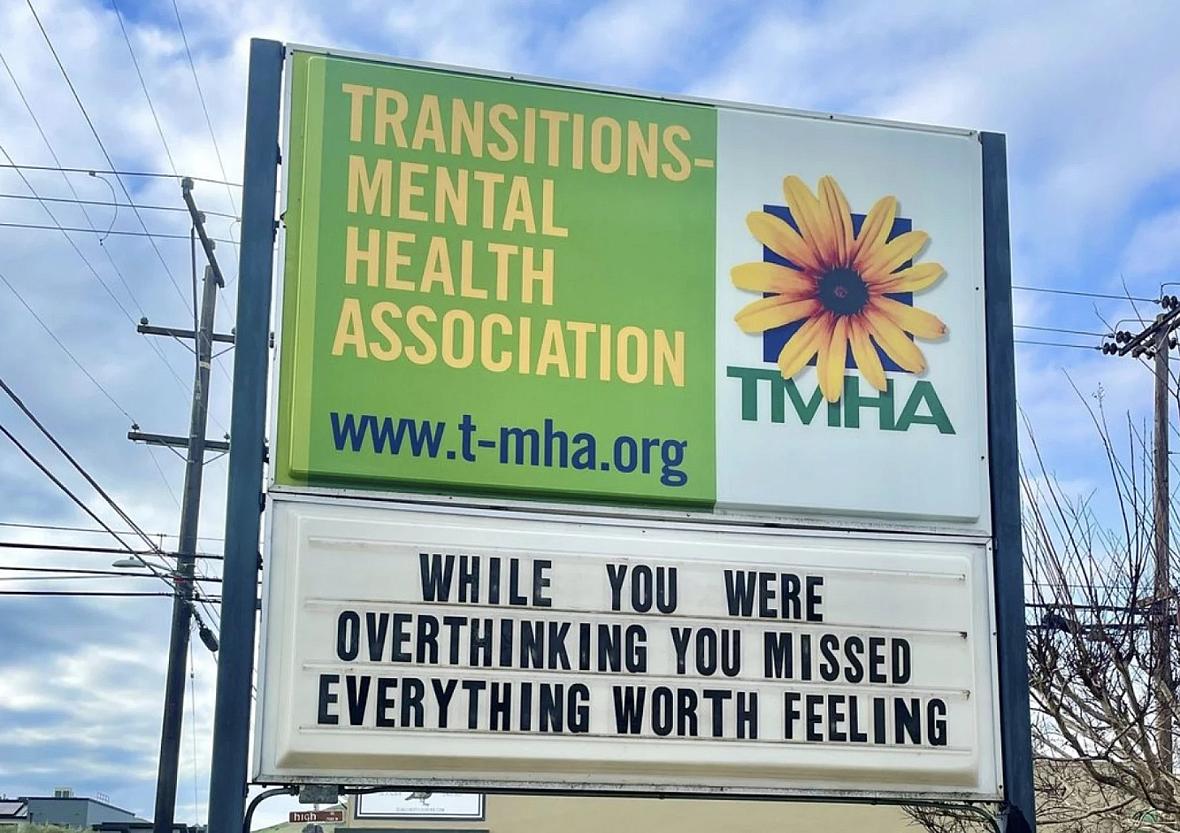
Transitions-Mental Health (TMHA) is one of the few organizations in the County that offers a comprehensive approach to homelessness and mental health.
(Courtesy Of @Tmha_slo Instagram Page)
Chad Lamb recalls one of his lowest moments of being homeless for over a decade.
As rain poured down on his tent at the Bob Jones Trail, Lamb felt crushed under the weight of his past decisions. The toll of numbing his PTSD with drugs and alcohol over the years was finally catching up to him.
Lamb remembered hearing police footsteps approaching. They told him to leave.
He found himself on all fours, hurriedly packing up his belongings. Lamb's clothes were soaked with rain and mud. At that moment, a realization washed over him.
“I can't do this anymore,” Lamb said. “I'm too old for this.”
Lamb, nearing 50, didn’t see this as just another tough night. He called it a turning point in his life.
“I felt determination to want to stop being high, to want to be a part of something– to basically feel anything other than anger and hatred all the time,” Lamb said.
For the last couple of years, Lamb has been living in supportive housing provided by Transitions-Mental Health Association. He’s sober. Here, he has a safe place to live and gets treatment for his PTSD.
“They've helped me observe myself in different ways that I wasn't able to,” Lamb said.
A team of health professionals and specialists, working with TMHA's Housing Now program, focuses on helping vulnerable individuals who are at high risk of dying on the streets.
Lori Eister, a therapist for the program, explained that TMHA is at the forefront of a statewide 'housing first' approach to address homelessness in San Luis Obispo County.
"Most programs say, ‘you can come into housing once you're sober– once you're on medication for your mental illness,’" Eister said, "We say, ‘you can come into housing now, and we'll work on those things as we go along.’"
In collaboration with TMHA, the San Luis Obispo City Mobile Crisis Unit hits the road to locate unhoused individuals.
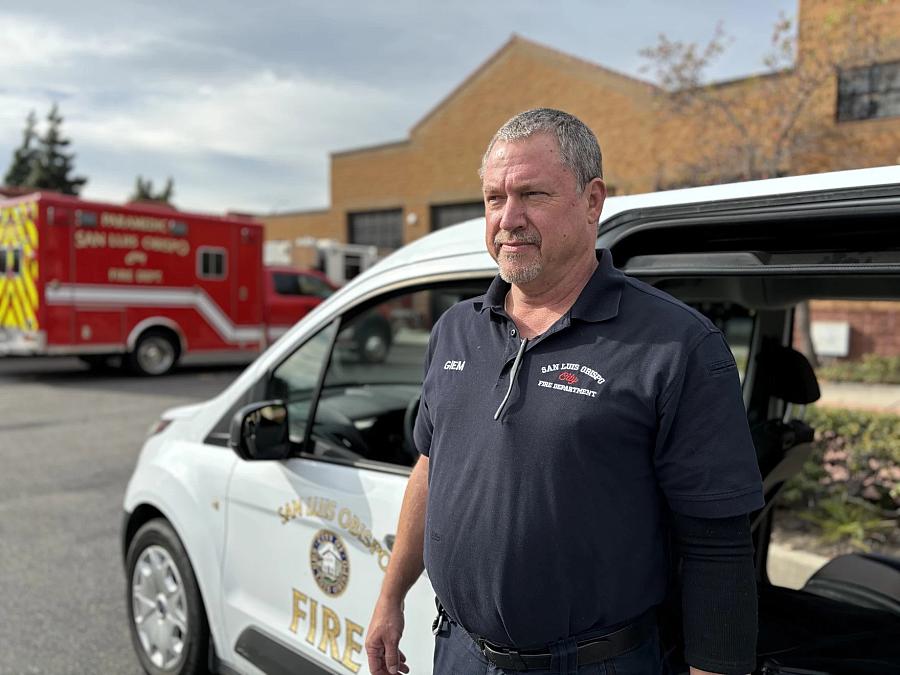
Scott Giem, a case manager for the MCU, drives around the city to offer homeless individuals food and mental health support.
(Photo By Amanda Wernik)
Scott Giem, a case worker with the MCU, shed light on the challenges of treating people with mental health issues when they’re in survival mode on the streets.
“These guys are hypervigilant through the night, not sleeping very well, because, typically, they may or may not be attacked and their stuff stolen,” Giem said.
Allan S., one of Lamb’s roommates in TMHA's housing, recounted his struggles surviving unsheltered.
“One time, I was sleeping In the bushes somewhere, and someone found me there. I got punched in the face and hit the head,” Allan said.
Allan turned to alcohol to cope, which he said landed him in the hospital multiple times for alcohol poisoning. After a doctor warned him that he had only a year left if he kept going, Allan decided to turn his life around with help from TMHA.
“Life's good again, and I'm healthy, happy and sober,” Allan said.
Eister explained that once clients have their basic survival needs met, they can begin to address their mental health needs.
“They sleep. They're finally safe,” Eister said. “They can finally shut the door– they can lock the door.”
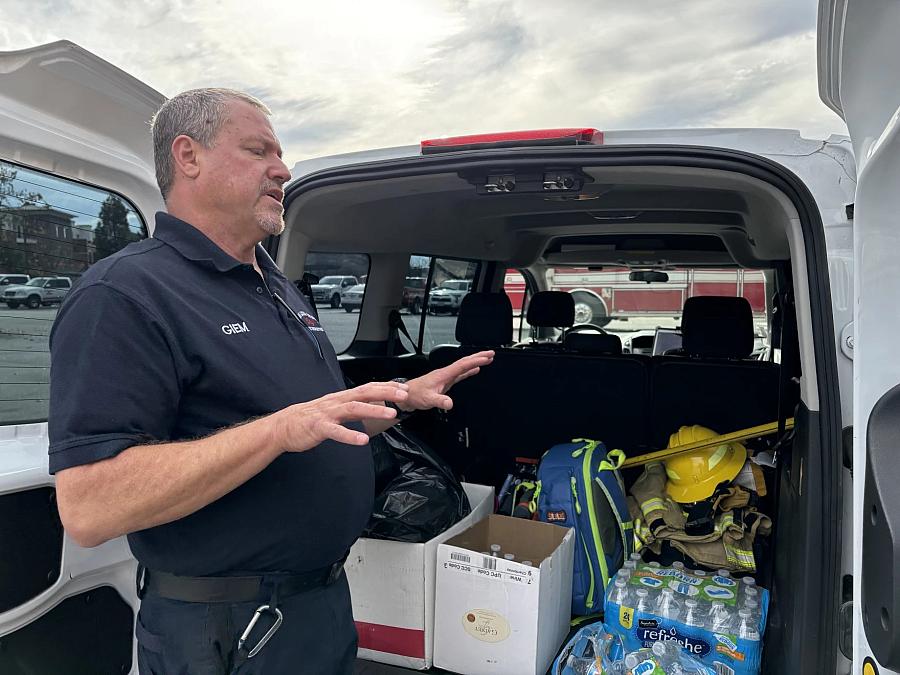
Scott Giem with the MCU loads up his car with food and supplies to distribute to unhoused people.
(Photo By Amanda Wernik)
Eister helps clients with PTSD work through their past traumas.
“I practice EMDR, which stands for Eye Movement Desensitization and Reprocessing,” Eister said.
In EMDR therapy sessions, clients talk about difficult memories while using techniques, such as moving their eyes side to side, to help their brain process the events.
Studies suggest this may be similar to how our brains process information during rapid eye movement (REM) sleep. It can help integrate troubling memories into the past, which may reduce their impact on the present.
For individuals with PTSD, this could lead to fewer flashbacks and other disruptive episodes.
Eister also focuses on helping clients change their negative thinking patterns.
“If you could hear the self-talk that goes on in the minds of these people, it’s pretty terrible the way they treat themselves.” Eister said.
“So it starts there, like, ‘hey, pay attention to the way you're internally talking to yourself, and try to be more kind, and try to be more gentle,” Eister added.
Peter Polzer, who lives in the same house as Lamb and Allan, shared that a tough breakup propelled him into years of homelessness. He recalled nearly drinking himself to death during that period.
He credited the staff at TMHA for providing a safe and comfortable environment that encouraged him to open up during sessions.
“That helps me to get out of my head because I always thought the world was against me and the sky was always falling because, honestly, it was for me for a long time,” Polzer said. “The world should be against me because I was not a productive member of society.”
Crystal Racicot, the Housing Now program manager, expressed her amazement at the positive changes she saw in residents' lives.
“I love those guys,” Racicot said. “It's fun seeing how they went from rock bottom to working, being clean, looking great and mentally being better, so it's definitely rewarding.”
At TMHA, the staff-client relationship involves a unique exchange of vulnerability from both sides. Racicot revealed that her own past experiences have taught her how to connect and relate to clients.
“I tell them that I've been homeless. I tell them that I've gone through some horrible things in my life,” Racicot said. “I let them know that I'm clean, and I choose to do that every day.”
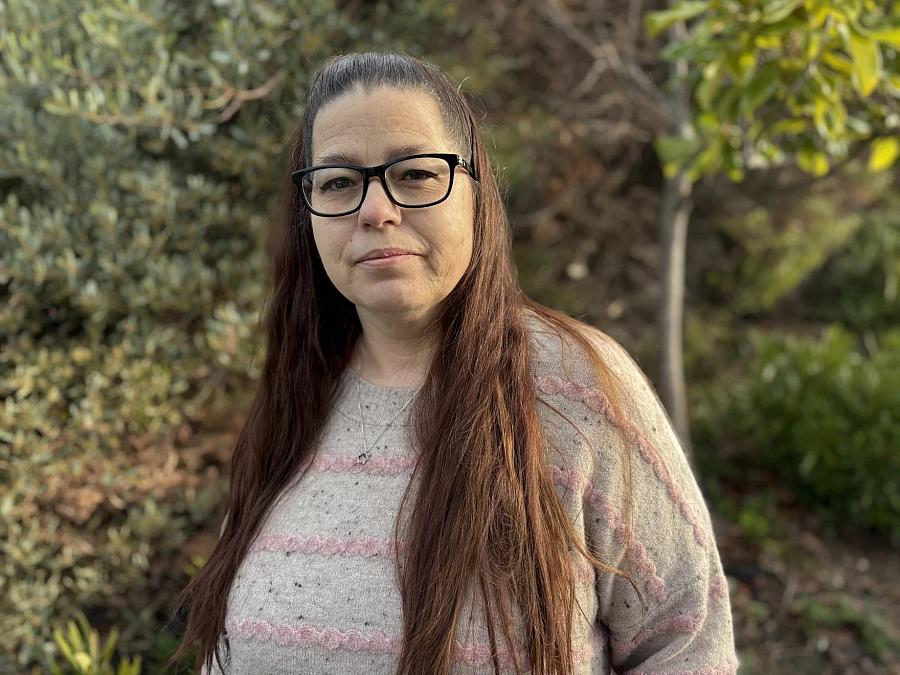
Crystal Racicot with TMHA was once homeless herself. She shares that her past struggles help her empathize and connect with clients.
(Photo By Amanda Wernik)
Lamb shared that he's struggled with trusting others all his life. However, working with TMHA's mental health specialists has dramatically changed his outlook.
“It's one of the hardest lessons to learn, and once you start to open up your mind, you'll hear things better,” Lamb said. “When you start to open up your heart, you'll feel compassion and empathy.”
TMHA stands out as one of the few organizations in the County that tackles homelessness comprehensively. Alongside the Housing Now program, it offers group support, help with finding employment and family services.
TMHA’s combination of supportive housing and mental health treatment plays a pivotal role in changing individual lives and breaking the cycle of homelessness.


